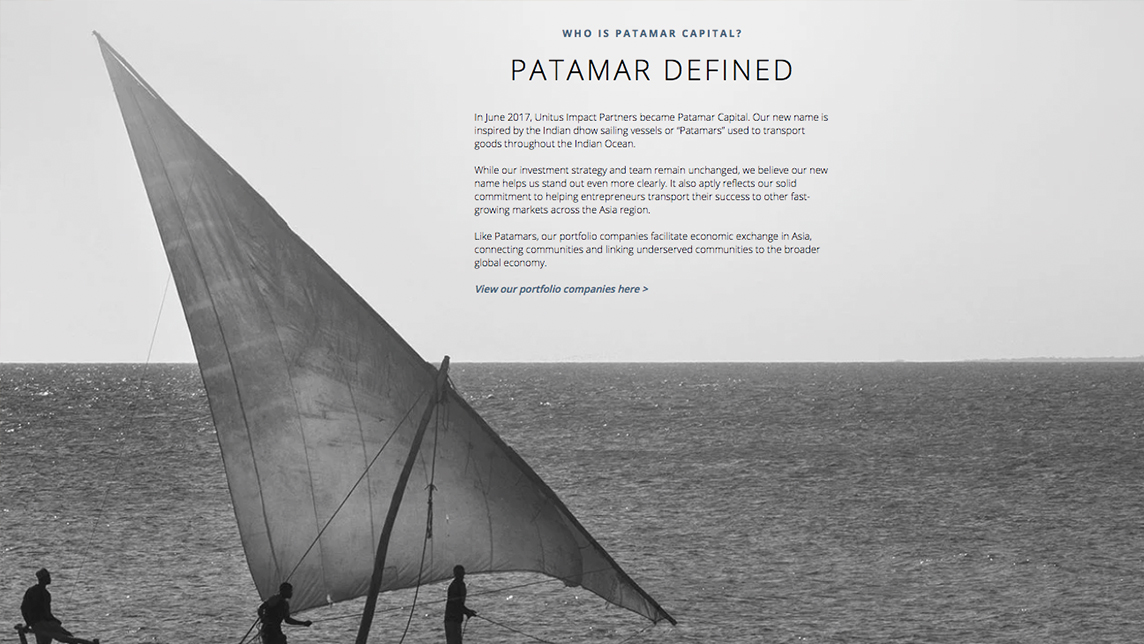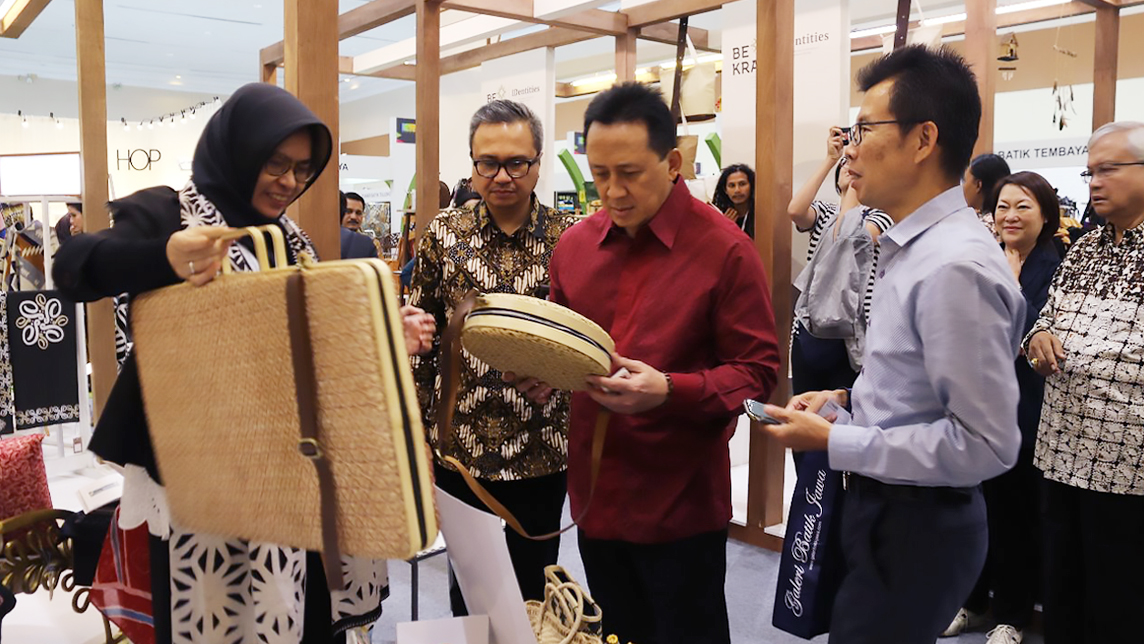Already a leader in venture capital impact investing in Asia with 17 years of experience of under its belt, Patamar Capital is eyeing even greater growth ahead, especially as it proves that socially responsible investing can coexist with attractive financial returns.
The formerly named Unitus Impact expects to raise US$150 million in a new fund (see story), with its first close in September, more than triple the US$45 million it currently manages. Patamar scored its biggest exit when one of its portfolio companies, Mapan, got snapped up by Indonesia’s largest unicorn, the ride-hailing and on-demand powerhouse Go-Jek, end of last year.
“As a result, when we were fundraising for our [latest] fund, we already had evidence that we have a success story [Mapan] in the making,” Patamar Associate Ellen Nio said in an interview.
“We were able to convince investors that if the funds are there, we can help bring up more people like [Mapan founder] Aldi [Haryopratomo] – people who want to make a big social impact and need the investment, but are also able to give desirable returns.”
Patamar is part of a fast-growing demand for socially responsible investing that saw private equity group TPG raise US$2 billion – exceeding the US$1.5 billion targeted – for its first global impact fund last year. Market estimates for impact investments vary widely, depending on definitions and assessment methodologies – from US$114 billion per the Global Impact Investing Network, to US$23 trillion estimated by the Global Sustainable Investment Alliance, both as of end-2015.
Patamar manages funds from family offices and development agencies globally, including the eBay Foundation and the Rockefeller Foundation. It is also linked to the Overseas Private Investment Corporation, a US government agency that helps American businesses like Patamar invest worldwide.
“Since we’re connected with OPIC, we can recommend our portfolio companies to OPIC to get low interest loans from the US. One of the problems for startups in Indonesia is in getting working capital,” Nio said, citing cautious local banks that tend to avoid giving business loans to startups.
Proven business model
By now, Patamar knows what it seeks in a social enterprise investment: a business model where the social impact is “baked in” right from the start, as exemplified by Mapan.
“What we often see is in some businesses, social impact happens because the company takes smaller margins or dedicates some of its revenues to CSR,” Nio said. “We believe that’s not a sustainable way to create social impact, because if their budget situation wasn’t so good, the social impact component could be the first to go.”
Taking a longer-term view, Patamar’s investment focus is to help low-income communities improve their livelihood through businesses that help them. This would in turn lead to increased income and access to affordable healthcare, education and jobs: “We define this as providing economic benefits to lower-income people.”
For example, Mapan, as an app for group-buying of household appliances at lower prices, started as a financial inclusion project. But it soon grew into a last-mile e-commerce player serving lower-income Indonesians.
“Often, these people get the lowest quality products in the worst possible ways, at unfairly high prices. This ineffective market linkage is something that we try to address,” Nio explained.
The products that attract Patamar would also need to have a certain “stickiness,” meaning users will continue to use the product as part of their daily lives – as opposed to one-off purchases or shopping on special occasions.
This would contribute to improving unit economics as well. “In the case of Mapan, for example, this is illustrated by them getting lower bulk buy prices and their tech investment costs being spread out over a greater number of consumers.”
Ultimately, all of this relates back to Patamar’s goal of being the pioneer in attracting capital into impact investing. As Nio put it: “There’s a lot of commercial capital to be had, but if we don’t use it to increase the income of lower-income people, they will be further marginalized.”
Investing in Women
Patamar also recently created a US$3 million fund dedicated to supporting women-led entrepreneurs in Southeast Asia with each investment of US$250,000 to US$350,000. Established in partnership with the Australian Government’s Investing in Women initiative, the fund made its first direct investment earlier this year in Sayurbox, a farm-to-table e-commerce startup from Indonesia.
“We found that 70–90% of customers and supply-chain stakeholders in our businesses are women,” but there was just one female CEO in the Patamar portfolio, Nio said. The said CEO is Hardika Shah, founder of SME-focused lending startup Kinara Capital.
Since starting their partnership with Investing in Women, Patamar has learnt to better spot new opportunities, unseen risks and unconscious biases.
For example, “when we meet a company, we think of how their patterns are similar to previous success stories, or how we are comfortable with investing in industries that we’re familiar with,” Nio said. But “we might have been missing good patterns and characteristics [among women entrepreneurs] because women entrepreneurs were underrepresented in the first place.”
“There’s also the chance that the women are working in industries that the investors, which are mostly men, don’t understand,” she continued, citing industries like ethical fashion, organic food and women’s reproductive health. “[These businesses] are not typical targets for VC investment, but it doesn’t mean that there’s no potential to invest at all.
Women compete, win differently
“On our part, we track the percentage of women entrepreneurs that we meet: out of the companies that we meet, how many had women founders? It turns out that it’s about 50%!”
Patamar has also seen how women occupy C-level roles in startups and contribute greatly to developing those companies, and yet own no equity.
“Sometimes women founders are hesitant to raise the issue to their own board, and they end up just sticking with it because they like their job,” Nio said. In such cases, Patamar advocates for the women founders to get shares in the company.
As part of their Investing in Women partnership, Patamar also runs themed accelerator programs dedicated to women enterprises. Sayurbox graduated from the first of such programs, which ran on the theme of agriculture. The second and latest program was based on ethical fashion.
The accelerator programs are modeled after programs run by Village Capital, where winners are selected by their peers assessing their teams, financials, products and other key criteria. Instead of creating a competitive atmosphere, Patamar wants to establish a more collaborative one, so that the entrepreneurs can continue to work together even after the program ends.
“We learned that women are not comfortable with the pitching format, which is used in many startup competitions. They are better able to win and gain if it’s built on a long-term relationship,” Nio said.
In ethical fashion, “some [startups] have reached US$1 million in annual revenue – some tech startups struggle to even get there,” Nio noted. In addition, the fashion supply chain is still inefficient and women in the industry are often treated poorly.
“What we’re looking for are companies that can solve this inefficiency with tech-enabled means.” Without a tech component, companies often stumble when they have to scale.
All hands on deck
Outside of monetary support, Patamar boosts its portfolio companies with its extensive knowhow and networks. To that end, Patamar usually tries to be involved in the boards of its portfolio companies, whether or not they get voting rights. “This is important because our partners bring new, important knowledge and expertise from the US and India to Southeast Asia,” Nio said.
In some cases, Patamar companies learn from one another. Nio gave the example of Sayurbox. “We’re connecting Sayurbox with LEAF, one of our portfolio companies in India,” which also deals in farm-to-table logistics. LEAF’s business encompasses the entire supply chain, from community-based farming initiatives to packaging and logistics.
LEAF is already handling large B2B transactions in India. Patamar is seeing the same potential to go B2B in Sayurbox. Rather than starting from scratch or seeking local companies to teach them, which can be difficult, it is easier for Sayurbox to tap Patamar’s network.
On a more general scope, Patamar also regularly gathers all of its portfolio companies and some of its partners in a global summit. One such event was held last year, with the theme of “Scaling with Sanity”. These meetings showcase Patamar’s entrepreneurs and their unique circumstances to the partners, which opens new opportunities for networking and collaboration.
Mapan post-Go Jek
Patamar’s most successful exit Mapan actually came about when founder Aldi Haryopratomo ran into new regulatory hurdles with his earlier startup, the social lending enterprise Ruma.
Ruma customers then needed to buy new cooking pots for intensive cooking during the Ramadan season – purchases Ruma was no longer able to finance through its loans. These lower-income groups then had to turn to borrowing from local creditors, who charged exorbitant interest.
So Haryopratomo offered to source cooking pots for them, buying the items in bulk to get cheaper prices. As he continued to talk to his customers, he discovered that others were struggling the same way, just with different types of purchases.
Hence Ruma pivoted into Mapan, a last-mile ecommerce company that sources for good quality items at reasonable prices for lower-income customers. The customers pay for the items in a system similar to “arisan,” or informal savings clubs often established among women.
Mapan’s “eagerness to learn about the market and serve the customers better” helped it survive the crisis, Nio said. “They faced a very major problem due to the regulation problem, but their familiarity with the consumers and their effort to understand their needs was what allowed them to successfully pivot.”
Post its acquisition by Go-Jek, Mapan is likely to “continue to serve the same customer segments, but on an even bigger scale. They can now tap into Go-Jek’s network,” she noted.
“Many of their customers, drivers and their families belong to Mapan’s target market in the first place. We think Mapan can stay true to their original vision in the long run.”














